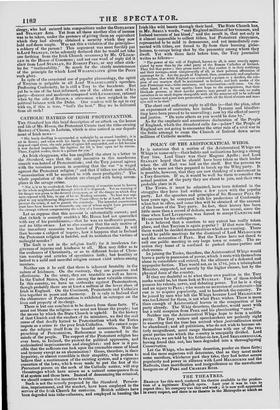POLICY OF THE ARISTOCRATICAL WHIGS.
IT is notorious that a section of the Aristocratical Whigs are Whigs in name only—their habits and inclinations having a strong Tory bias. Lord GREY was their Magnus Apollo ; and Lord STANLEY hoped that he should have been taken as their leader when the old Earl was laid on the shelf. But the persons we allude to were not then prepared to break up the Whig party. It is possible, however, that they are now thinking of a movement in a Tory direction. if so, it would he well for them to consider the actual position of the party they are about to join, and their own probable place in it.
The Tories, it must be admitted, have been defeated in the struggles they have had within a few years with the popular party. Let the speeches and principles of Sir ROBERT PEEL fif- teen years ago, be compared with his professions of Conformity when last in office, and some idea will be obtained of the amount of the losses of the Tory party. In fact, their history has been little more than a record of defeats, more or less severe, since the time when Lord LIVERPOOL was forced to accept CANNING and HUSKISSON for his colleagues.
Is it believed that a reaction to any extent has really taken place, and that Toryism is again popular ? If that were the case, there would be decided demonstrations which are wanting. There would be public meetings for the dismissal of Lord MELBOURNE and the restoration of PEEL. But the Tories have not dared to call one public meeting in any large town or county. The re- action they boast of is confined to packed dinner-parties and cl ub-rooms.
In joining the Tories, therefore, the Aristocratical Whigs would leave a party in possession of power, which it rests with themselves alone to consolidate and extend, for the alliance of a defeated and unpopular faction. They would not, as in 1794, join a triumphant Minister, supported, not merely by the higher classes, but by the physical force of the country.
If they arc doubtful as to what their own position in the Tory ranks would be, let them look at STANLEY. Few of them indeed possess his talents, nerve, and debating power. Yet he is a clog and an injury to PEEL; who wants no accession of aristocrats—his cue is to acquire popularity, and to hoodwink the country. To be joined by men who left the Whigs because Lord MELBOURNE was too Liberal for them, is not what PEEL wishes. There is more than enough of Aristocratical leaven in the composition of his party already. The Whig deserters, therefore, would meet with but a cold reception from PEEL and his placehunting "crew." Neither can the Aristocratical Whigs hope to form a middle party. The Tory writers and speechmakers are perfectly right in asserting that the time has arrived when justemilieuism must be abandoned ; and all politicians, who do not wish to become ut- terly insignificant, must range themselves with one of the two great parties into which the country is unequally divided. Lord STANLEY, we are told by his father-in-law, Lord SKELSMERSDALE, having found this out, has been degraded into a thoroughgoing Conservative.
Let the Whigs, who meditate desertion, ponder on these facts; and the more sagacious will determine, that as they must make some sacrifices, whichever part they take, they had better secure popularity and power in alliance with Lord MELBOURNE and the Radicals, than mortification and insignificance as the unwelcome hangers-on of PEEL and CHARLES Ross.


























 Previous page
Previous page